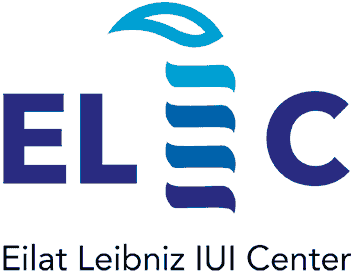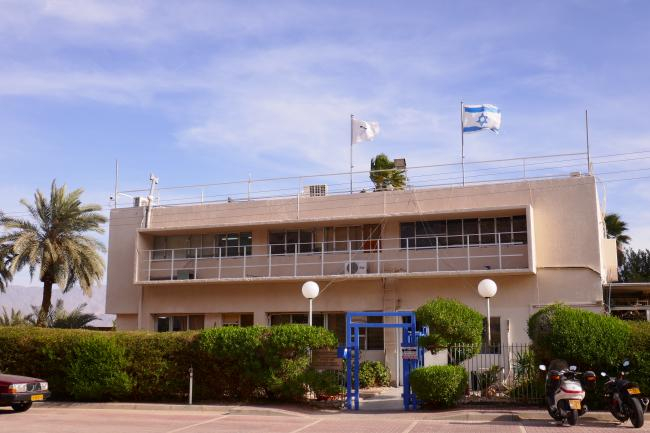Dieser Text ist zur Zeit nur auf Englisch verfügbar...
Following the 2016 signing of the Memorandum of Understanding (MoU) between the Leibniz Association and the in Eilat, Israel (IUI), the ELIC project is the first joint undertaking in the framework of this agreement. Short for Eilat Leibniz IUI Center, ELIC’S objective is to advance marine sciences in the Red Sea area and to ultimately become an international hub for excellence in marine science.
This research collaboration geographically centres around the Gulf of Aqaba. Its setting as the northernmost tropical coral reef in the world, immediately adjacent to the deep sea, is unique. It makes the Gulf of Aqaba a textbook example for studying resilience of ecosystems and lateral exchange of ecosystems under environmental change.
ELIC research carried out at IUI is facilitated by the significant logistic advantage of immediate access to the coral reefs in their natural surroundings, ship access to the deep sea within 750 m off the shore, and high-level laboratories and a high-end experimental aquarium facility right next to the sea.
ELIC engages primarily in fostering bilateral German Israeli long-term research collaboration. One means to sustain that is a joint lab that is currently being built up in Eilat on the IUI campus.
During the years 2017 and 2018 partners from IUIs associated Universities and Institutes have built a network with Leibniz researchers. Common research topics have been identified with a matchmaking-exercise through questionnaires and personal meetings. These ideas have led to joint measurements taking place in the course of 2018 at IUI in Eilat. In the following, the titles of the individual research projects and the cooperating institutes are listed:
- The multidisciplinary role of mineral dust - An example case study in the Gulf of Aqaba (Weizmann Institute, TROPOS)
- The role of groundwater discharge from sub-desert aquifers into the Gulf of Aqaba (Bar-Ilan University, IOW, ZMT)
- Coral reef fish size spectra across a human disturbance gradient (Tel Aviv University, IGB)
- Evaluation of the effects of aeolian dry deposition on biogeochemical cycling of redox-sensitive elements in the sediments of the Gulf of Aqaba (Ben-Gurion University, IUI, IOW)
- Biodiversity of the Red Sea Octocorals: an integrative study (Tel Aviv University, SGN / MfN)
- Governance of tourism in the Gulf of Aqaba (Technion, ZMT)
- Revealing the multifaceted nature of fish herbivory on Red Sea coral reefs and the impacts of microplastics on this crucial ecosystem function (Haifa University, ZMT)
- Mutualistic fish and coral interactions (IUI, ZMT)
Plans for the future include a joint program of workshops and seminars to train young researchers from Germany and Israel in relevant fields of marine sciences and to enhance collaboration from the earliest phase. Already now, relevant workshops and seminars offered by one partner are open to all ELIC partners.

Flyer ELIC project for download.
Project Partners from Leibniz Association (Germany) |
International Project Partners (Israel), founding universities and institutes of the Interuniversity Institute for Marine Sciences (IUI) | |
|---|---|---|
|
Leibniz Centre for Tropical Marine Research (ZMT) Leibniz Institute for Baltic Sea Research (IOW) Leibniz Institute for Tropospheric Research (TROPOS) Senckenberg Research Institute and Natural History Museum (SGN / MfN) Leibniz Institute of Freshwater Ecology and Inland Fisheries (IGB) |
Hebrew University Tel Aviv University Bar Ilan University Ben Gurion University University of Haifa Technion Weizmann Institute Technion Israel Institute of Technology |
The following institutes have been involved in the initial planning phase: Leibniz Institute for Analytical Sciences (ISAS), Leibniz Institute for Applied Geophysics (LIAG), Leibniz Institute DSMZ-German Collection of Microorganisms and Cell Cultures (DSMZ) and Leibniz Institute of Plant Biochemistry (IPB).
The study, "Herbivorous fish feeding dynamics and energy expenditure on a coral reef: Insights from stereo-video and AI-driven 3D tracking", was conducted within the framework of the 2017/2018 “European Scientific Diver” training course at the Interuniversity Institute (IUI) in Eilat. Supported by the Eilat Leibniz IUI Center (ELIC), this research utilized advanced stereo-video systems and cutting-edge AI-driven multiobject 3D tracking to examine herbivorous fish feeding behaviours and field metabolic rates. Funding for AI model adaptation and analysis was provided to Julian Lilkendey by the Fisheries Society of the British Isles (grant number FSBI-RG21-302).





